Towers Standard: Difference between revisions
(Expanded article and added Cargo table entry) |
(fleshed out wording) |
||
| Line 1: | Line 1: | ||
When | When the Lord of the Rings TCG began, there was only one format: the cards that existed. With the release of [[The Two Towers]], Decipher split the game into three formats: | ||
* [[Fellowship Block]], allowing cards from [[Fellowship of the Ring]], [[Mines of Moria]], and [[Realms of the Elf-lords]] | * [[Fellowship Block]], allowing cards from [[The Fellowship of the Ring]], [[Mines of Moria]], and [[Realms of the Elf-lords]] | ||
* [[Towers Block]], originally only allowing cards from The Two Towers with [[Battle of Helm's Deep]] and [[Ents of Fangorn]] added as they were released | * [[Towers Block]], originally only allowing cards from The Two Towers with [[Battle of Helm's Deep]] and [[Ents of Fangorn]] added as they were released | ||
* Open, allowing cards from all sets ( | * Open, allowing cards from all sets (but only using Towers Block sites) | ||
It quickly became apparent that the open format had problems in a competitive environment; in particular, there was a lack of deck diversity at the top level<ref>https://web.archive.org/web/20030402125243/http://www.dgma.com/content/default.asp?id=361</ref>. In order to solve this issue, Decipher introduced a new format, [[Standard Format|Standard]], which had the same | It quickly became apparent that the open format had problems in a competitive environment; in particular, there was a lack of deck diversity at the top level<ref>https://web.archive.org/web/20030402125243/http://www.dgma.com/content/default.asp?id=361</ref>. In order to solve this issue, Decipher introduced a new format, [[Standard Format|Standard]], which had the same card pool as the Open format but with an [[X-List]] of banned cards. This was done in March 2003, right on the heels of the release of [[Battle of Helm's Deep]]. | ||
Unlike block formats, which were continuously supported by Decipher mostly unchanged, Standard was always an evolving format. Once set 7 was released there | Unlike block formats, which were continuously supported by Decipher mostly unchanged, Standard was always an evolving format. Once set 7 was released there was a new [[King Block]] site path and drastically different culture focuses, and so it represented a logical branching point. Over time, the term "Towers Standard" came to refer to the [[Standard Format]] as it existed immediately before the release of [[The Return of the King]] in November 2003. | ||
Ring-bearer [[Skirmish Cancellation|skirmishes can be cancelled]] in Towers Standard, as that rule had not yet been introduced. However, only cards from Towers Block are able to accomplish the task: the cards from Fellowship | Because Towers introduced several completely new cultures and self-complete subcultures, there is considerable overlap between the two Towers formats anyway -- the World Champion deck of Towers Standard included just 8 cards from Fellowship Block<ref>https://lotrtcgwiki.com/forums/index.php?topic=12100.0</ref>, most of them at only one copy. The biggest difference is how to handle swarms, as Towers Block has almost no support for Frodo ({{Card|4C306}} and The One Ring are the only ways to increase his strength) and relatively tame controls for large fellowships. | ||
Ring-bearer [[Skirmish Cancellation|skirmishes can be cancelled]] in Towers Standard, as that rule had not yet been introduced. However, only cards from Towers Block are able to accomplish the task: the cards from Fellowship Block had either been banned ({{Card|O Elbereth! Gilthoniel!}}) or ruled to only function on the Fellowship site path ({{Card|Hobbit Stealth}}). | |||
==Decklists== | |||
Decklists for Towers Standard can be found at [http://lotrtcgwiki.com/forums/index.php/board,39.0.html this subforum] of the Last Homely House. | |||
== X-List == | == X-List == | ||
Revision as of 03:09, 20 October 2022
When the Lord of the Rings TCG began, there was only one format: the cards that existed. With the release of The Two Towers, Decipher split the game into three formats:
- Fellowship Block, allowing cards from The Fellowship of the Ring, Mines of Moria, and Realms of the Elf-lords
- Towers Block, originally only allowing cards from The Two Towers with Battle of Helm's Deep and Ents of Fangorn added as they were released
- Open, allowing cards from all sets (but only using Towers Block sites)
It quickly became apparent that the open format had problems in a competitive environment; in particular, there was a lack of deck diversity at the top level[1]. In order to solve this issue, Decipher introduced a new format, Standard, which had the same card pool as the Open format but with an X-List of banned cards. This was done in March 2003, right on the heels of the release of Battle of Helm's Deep.
Unlike block formats, which were continuously supported by Decipher mostly unchanged, Standard was always an evolving format. Once set 7 was released there was a new King Block site path and drastically different culture focuses, and so it represented a logical branching point. Over time, the term "Towers Standard" came to refer to the Standard Format as it existed immediately before the release of The Return of the King in November 2003.
Because Towers introduced several completely new cultures and self-complete subcultures, there is considerable overlap between the two Towers formats anyway -- the World Champion deck of Towers Standard included just 8 cards from Fellowship Block[2], most of them at only one copy. The biggest difference is how to handle swarms, as Towers Block has almost no support for Frodo (Hobbit Sword (4C306)
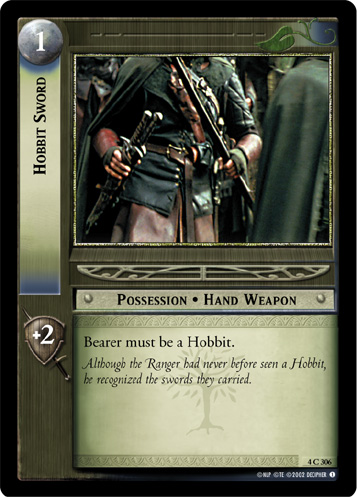 and The One Ring are the only ways to increase his strength) and relatively tame controls for large fellowships.
and The One Ring are the only ways to increase his strength) and relatively tame controls for large fellowships.
Ring-bearer skirmishes can be cancelled in Towers Standard, as that rule had not yet been introduced. However, only cards from Towers Block are able to accomplish the task: the cards from Fellowship Block had either been banned (O Elbereth! Gilthoniel! (2R108)
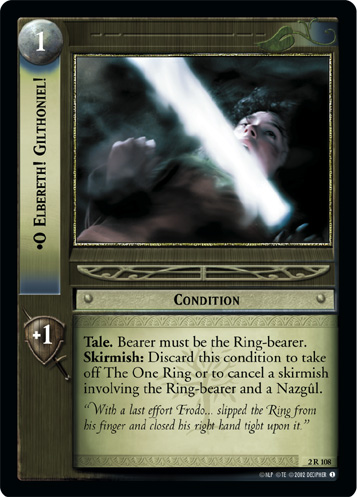 ) or ruled to only function on the Fellowship site path (Hobbit Stealth (1C298)
) or ruled to only function on the Fellowship site path (Hobbit Stealth (1C298)
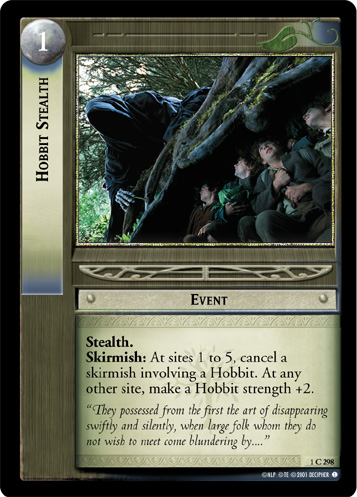 ).
).
Decklists
Decklists for Towers Standard can be found at this subforum of the Last Homely House.
X-List
The following cards cannot be included in Towers Standard decks, with a brief description of why they were banned. Most Free Peoples cards on the inaugural list were banned because they had little or no "cultural enforcement," meaning almost any deck could too easily benefit from them. For more details, see X-List.
- Elrond, Lord of Rivendell (1R40)
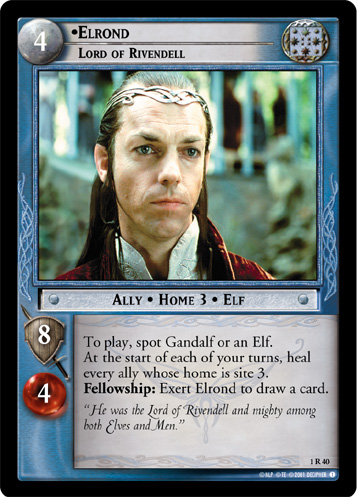 - too much utility and too little cultural enforcement
- too much utility and too little cultural enforcement - Galadriel, Lady of Light (1R45)
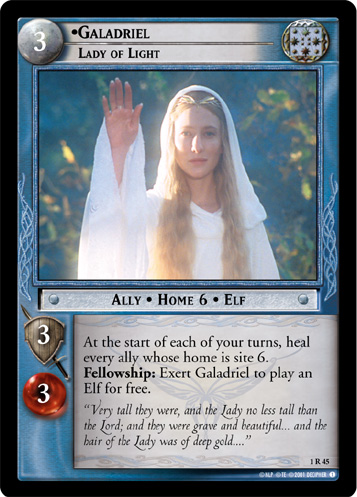 - too much utility and no cultural enforcement, enabling all the other allies with a home site of 6 which also have no cultural enforcement
- too much utility and no cultural enforcement, enabling all the other allies with a home site of 6 which also have no cultural enforcement - Ottar, Man of Laketown (1R80)
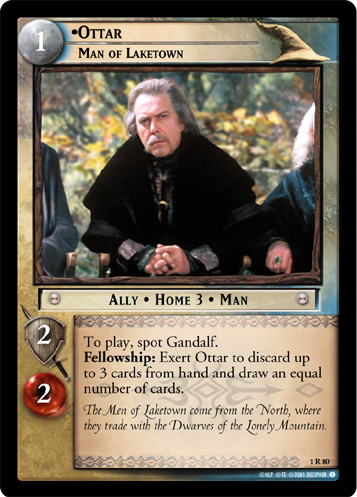 - effect is too strong and out of place in the
- effect is too strong and out of place in the Gandalf culture, with too little cultural enforcement
- No Stranger to the Shadows (1U108)
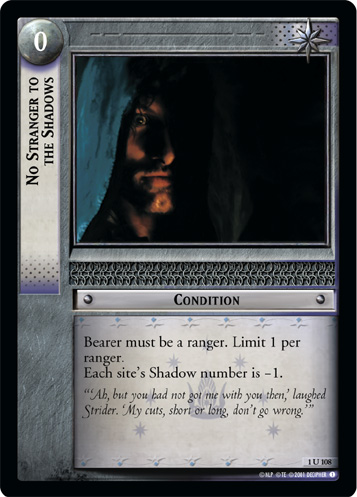 - the permanent resource denial provided is too extreme (there were also only 3 Rangers in Fellowship block, but many in Towers)
- the permanent resource denial provided is too extreme (there were also only 3 Rangers in Fellowship block, but many in Towers) - Savagery to Match Their Numbers (1R139)
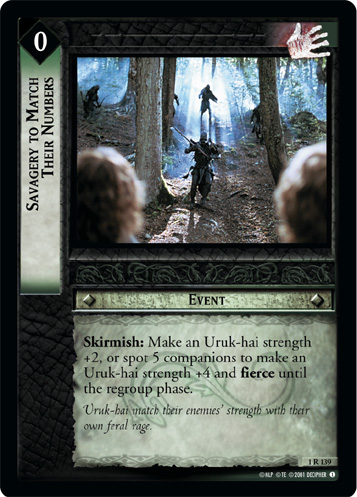 - too strong with no cost, outperforming any other strength event
- too strong with no cost, outperforming any other strength event - Úlairë Nertëa, Messenger of Dol Guldur (1U234)
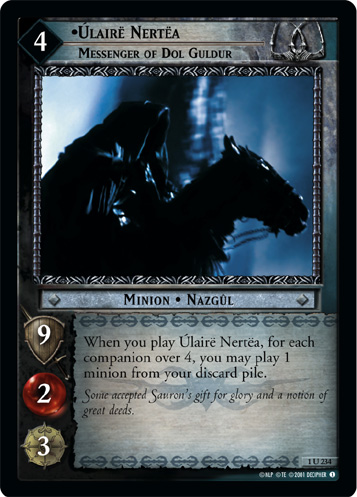 - too much utility and no cultural enforcement
- too much utility and no cultural enforcement - Forces of Mordor (1C248)
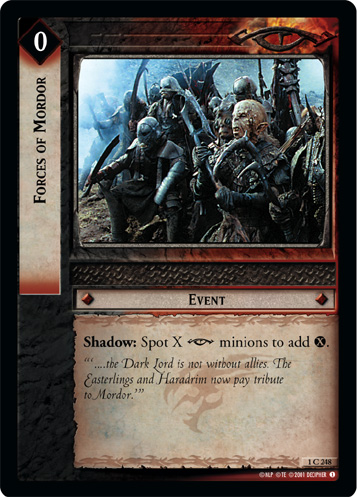 - too powerful in concert with the Towers block
- too powerful in concert with the Towers block Sauron trackers, which draw cards
- Sting (1R313)
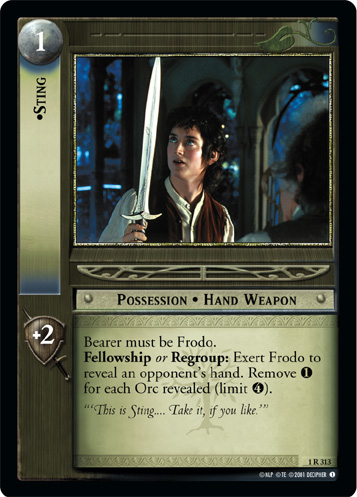 - no cultural enforcement (as every deck must start with Frodo), undercosted
- no cultural enforcement (as every deck must start with Frodo), undercosted - Flaming Brand (2R32)
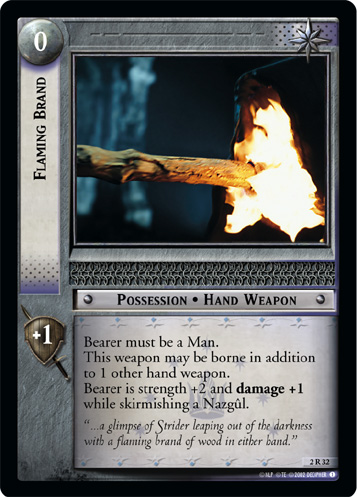 - no cost and no cultural enforcement
- no cost and no cultural enforcement - Filibert Bolger, Wily Rascal (2C101)
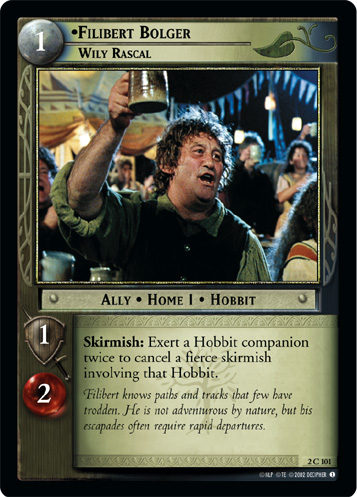 - no cultural enforcement and allows the Ring-bearer's skirmish to be cancelled at site 9
- no cultural enforcement and allows the Ring-bearer's skirmish to be cancelled at site 9 - O Elbereth! Gilthoniel! (2R108)
 - no cultural enforcement and allows the Ring-bearer's skirmish to be cancelled at site 9
- no cultural enforcement and allows the Ring-bearer's skirmish to be cancelled at site 9 - Aragorn, Heir to the White City (3R38)
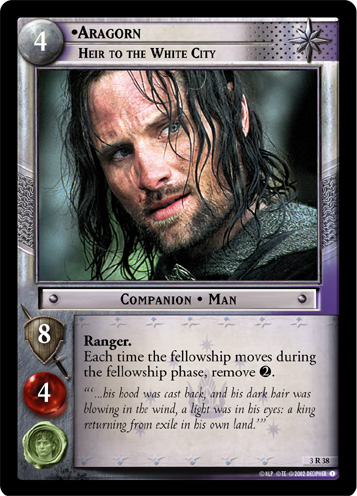 - the permanent resource denial provided is too extreme with no cultural enforcement
- the permanent resource denial provided is too extreme with no cultural enforcement - Horn of Boromir (3R42)
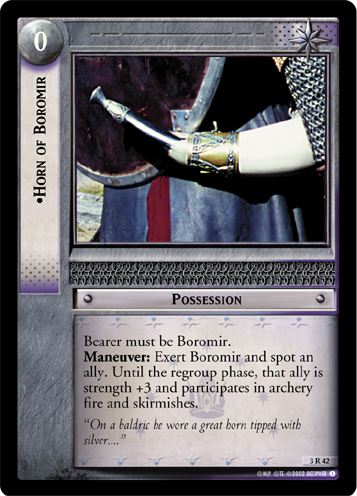 - no cultural enforcement and permanently circumvents the Rule of 9
- no cultural enforcement and permanently circumvents the Rule of 9 - Saruman, Keeper of Isengard (3R68)
 - doubles the number of skirmishes Uruk-hai take part in and nullifies most non-skirmish solutions for those Uruk-hai
- doubles the number of skirmishes Uruk-hai take part in and nullifies most non-skirmish solutions for those Uruk-hai - Uruk Regular (4C192)
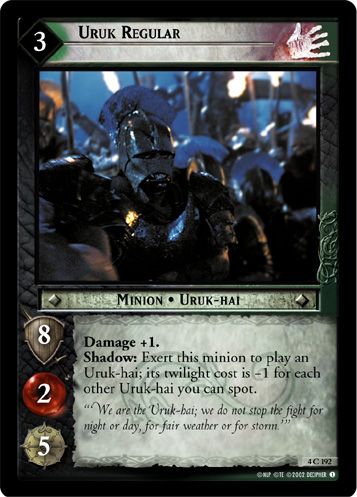 - ability too extreme combined with Deep of Helm (4U347)
- ability too extreme combined with Deep of Helm (4U347)
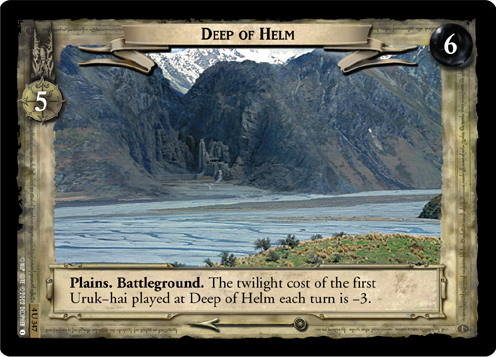
References
| Formats |
|---|
| Sets | 1 | 2 | 3 | 4 | 5 | 6 | 7 | 8 | 10 | 9 | 11 | 12 | 13 | 14 | 15 | 17 | 18 | 16 | 19 |
|---|---|---|---|---|---|---|---|---|---|---|---|---|---|---|---|---|---|---|---|
| Historical Decipher Formats | Fellowship Block | Towers Block | King Block | War of the Ring Block | Hunters Block | ||||||||||||||
| Towers Standard | |||||||||||||||||||
| King Standard | |||||||||||||||||||
| Movie Block | |||||||||||||||||||
| War of the Ring Standard | |||||||||||||||||||
| Standard | |||||||||||||||||||
| Expanded | |||||||||||||||||||
| Open | |||||||||||||||||||
| Player's Council Formats (including PC Errata) | 1 | 2 | 3 | V1 | 4 | 5 | 6 | 7 | 8 | 9 | 10 | 11 | 12 | 13 | 14 | 15 | 16 | 17 | 18 | 19 |
|---|---|---|---|---|---|---|---|---|---|---|---|---|---|---|---|---|---|---|---|---|
| PC-Fellowship | ||||||||||||||||||||
| PC-Movie | ||||||||||||||||||||
| PC-Expanded | ||||||||||||||||||||
| Unofficial Formats | 1 | 2 | 3 | 4 | 5 | 6 | 7 | 8 | 10 | 9 | 11 | 12 | 13 | 14 | 15 | 17 | 18 | 16 | 19 |
|---|---|---|---|---|---|---|---|---|---|---|---|---|---|---|---|---|---|---|---|
| French | French | ||||||||||||||||||
| Austrian (Movie) | |||||||||||||||||||
| Austrian (Shadows) | |||||||||||||||||||
| Other Variants | |||||
|---|---|---|---|---|---|
| Sealed • Booster Draft • Cube Draft • Culture Shock • Highlander • Poor Man's • PC Errata | |||||